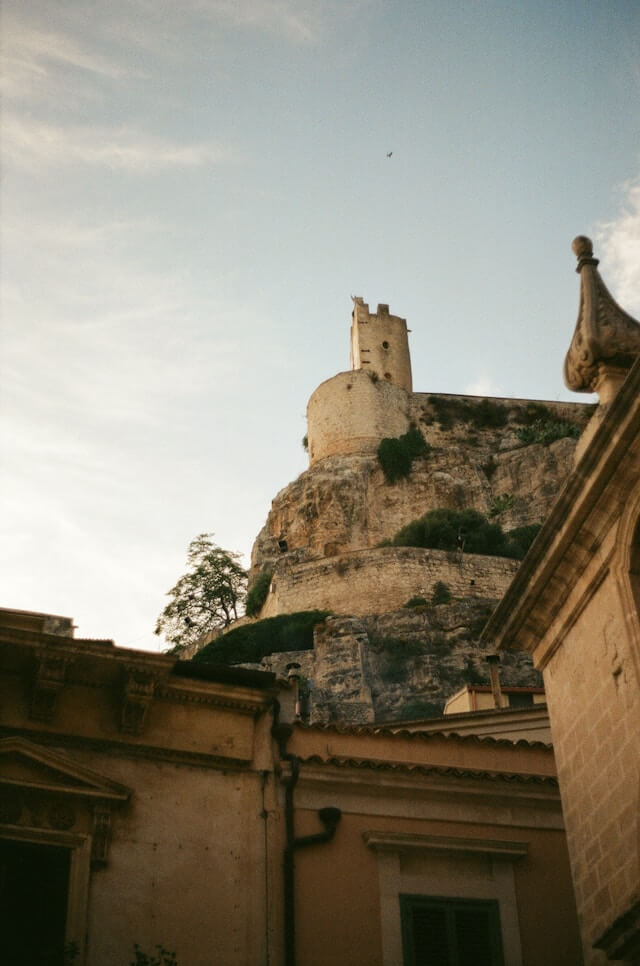Medieval Sicilian Lament in Diaspora
…All we do, crumbles to the ground, though we refuse to see Dust in the wind, all we are is dust in the wind Don’t hang on, nothing lasts forever but the earth and sky It slips away, and all your money won’t another minute buy. Dust in the wind, all we are is dust in the wind…
— from Dust in the Wind, lyrics by Kansas
This post focuses on how the significance of a twelfth-century poem has shifted over time and geography according to its audiences. PDF of the poem provided here.
There exists a gap in literary studies of the Mediterranean between ancient Greek and medieval Latin works. Few scholars have examined Arabo-Sicilian lyric that flourished from the ninth to the twelfth centuries, replacing Greek verse and informing later compositions in Latin and other languages. This poem is an elegy (a lament, a poem composed to honor someone passed away). The poet’s diwan (collected poems) was both celebrated and preserved, yet it remains unstudied. Through close reading, it becomes clear that the poet mourns both mother and motherland, thus revealing a broad elegiac spectrum, from personal loss to the general loss of homelands and the familiar.
My reading of this elegy by Ali al-Ballanubi demonstrates the following: 1) how the elegy expresses the poet’s grief for his mother, 2) how it may reveal his reaction to physical displacement after the invasion of Sicily, and 3) how the elegy could take on special meaning to certain audiences, such as mystics and immigrants.
Our poet grew up in the small town of Ballanuba to an educated family, with an intellectual father who wrote and taught. Ballanuba would become Bellanova under the Normans (the Norman conquest took place 1061-1091). It would remain so until it was destroyed in 1246 by Frederick II of Hohenstaufen. The Muslims were killed or relocated, and the Christians dispersed. By the time that our poet was a young man, Arab Sicily was defeated by the Normans.
Having fled to Alexandria after the Norman invasion of Sicily, most of Ali’s poetry was recorded, and perhaps composed, in Egypt. There Ali was known for his teaching, as well as his panegyric compositions for some of the great patrons of his day. Little is known of his daily life, though there remains a brief poem he wrote for his teacher of Arabic grammar in Egypt, as well as several exchanges of verses between Ali and other poets. He died in 1106.
Ali’s poetry ranges through panegyric, love poetry, wine poetry, political poetry decrying corruption, and description (of the Nile, a dancer, and a palm tree). However, to my knowledge, there exists only a single elegy by Ali, for his mother.
Close Reading
See the poem and its translation on the PDF handout here. I’ll draw your attention to only a few details instead of a full close reading because I want to concentrate more on my analysis.
In the fifth line, Ali contrasts the physical nearness of the mother’s corpse with the emotional distance of loss. This is the idea shared by ancient elegists, that the loved one who has died is close by and at the same time as far away as an unreachable star (Smoor, “Elegies,” 80). The paradox of distance provides an effect of contrast and expresses eloquently the quandary of one coming to terms with death or even the distancing experienced with an aging loved one, as he or she may no longer be able to interact or associate with people.
The sixth and seventh lines introduce the element of water. A steady drizzle brings comfort to the deceased, and the soil of the grave grows vegetation and flowers. The image of rain, common in Arabic poetry, represents every blessing. The flow of water in an elegy is also a metaphor for tears cried over the death of the loved one: those left behind give of themselves as they water the grave.
In the eighth line, the mother begins a journey. We accompany her past four marvels, each more marvelous than the last: from the golden nadir to the North star, and from Islam’s most famous sanctuary to the noble traits by which people live and die. Then we halt, enchanted by glorious rays of light, only to see that they are emanating from within the grave!
The speaker of the poem describes the ultimate trials of life beginning from line 17. The loved ones who he counted on to accompany him turned out to be only temporary companions on the journey. The harshness of coping with death taught him that all are deluded by optimism. This concept, radical and yet universal, reappears throughout world literature, both secular and sacred. Among the characters in Voltaire’s Candide, for example, only a few see past the meaningless optimism that comforts the masses. Similarly, the legendary Buddha attains singular enlightenment after observing the meaninglessness of earthly life.
Line 24 shows the meaninglessness of earthly possessions: neither a dirham (currency rendered in my translation as ‘dollar’) nor a house will remain. If a house may be understood more generally as a homeland, then the elegy gains an added dimension. Not only does it mourn the passage of the poet’s mother, but it also laments the passage of his motherland.
The speaker in line 25 exhorts himself (and simultaneously the audience) to be patient, as there is no sense in fighting death. He addresses fate angrily in the next line, naming his greatest sorrow: “a camel litter of yours that was never avenged.” The camel litter, a vehicle of protection on desert journeys, functions in the poem as metonymy for womenfolk. Ali uses the stock image of unavenged women to express his anguish over losing his mother. In addition, having opened his poem by reflecting on all mothers, the poet evokes the sentiment of human loss generally, as well as the sorrow of Sicilians and others who had lost their motherlands.
The cruelty of fate is perhaps the most common theme in elegies, at least those of Semitic languages and their neighbors. Yet the image of line 29 stands out from other elegies for its harsh frankness. The mother dies, surrounded by the survivors who ritually circle around her, as if she were a precious sacrifice to be divided among them. Ali here presents a maysir scene, in which a community bonds over a feast. Just as children benefit from mothers’ sacrifices, so Ali and the other Mediterranean transients benefit from the homelands they have lost.
The singer alone does not make a song, there has to be someone who hears: One man opens his throat to sing, the other sings in his mind. Only when waves fall on the shore do they make a harmonious sound; Only when breezes shake the woods do we hear a rustling in the leaves. Only from a marriage of two forces does music arise in the world. Where there is no love, where listeners are dumb, there never can be song.
— Rabindranath Tagore, “Broken Song,” in Tagore, Selected Poems, tr. William Radice (Harmondworth: Penguin, 1987), 55.
Interpreting the Poem
If this poem is the only elegy Ali ever composed, it raises the questions: Why did he select this genre for this poem? Why is it in honor of his mother, specifically? Even if it is not the only elegy he ever wrote, the question remains important for determining why this poem has been preserved: Why recite repeatedly the elegy of one’s own mother, and perhaps more remarkably, another man’s mother?
Arabic elegy (rithaʾ) developed originally from women’s funerary laments for male family members, prior to the revelation of Islam, then to official poems of mourning for people of rank in the Islamic political authority, to then eventually encompass virtually all family members, as well as lovers, families, colleagues, and patrons, as well as cities and communities. This development of elegy to memorialize non-human subjects, such as fallen dynasties, informs my reading of Ali’s elegy as expressing loss of the captured homeland, and rithaʾ is the genre that best fulfills such a function.
Why a Mother?
Ali’s elegy for his mother does not display the desperation present in some other examples of rithaʾ. But I do not read Ali’s elegy as a mere exercise, as if the lacking depth of detail in describing his mother somehow implied an equal lack in his depth of feeling. Rather, it seems to me that the effect of Ali’s conventionality is the easy extension of the specific woman to metaphorically encompass all mothers and motherlands. The tone of acceptance in Ali’s elegy for his mother leads me to speculate that perhaps he composed it after his move to Egypt and in conjunction with the decision to never return to his homeland. Perhaps he reconciles himself to exile from his motherland, in the face of Norman invasion, through meditating on his mother.
The comparison between a motherland and a mother is simple enough to be easily understood by a general audience. If Ali wanted to make a statement in Arabic poetry about his relationship to Sicily, especially after deciding to leave it (or her), then composing an elegy for his mother is the most natural way to do so.
If those who heard and read Ali’s poem in the twelfth century understood his mother to be symbolic of pre-Norman Sicily, then the poem could offer a political position. Ali honors all mothers, and wishes for their safety. Yet he never calls upon his audience to protect them or defend their interests. The opening line seems almost to foreshadow a call to arms, yet Ali is not a fighting man, or at least this is not a fighting poem. He makes recourse to poetry and to hope in paradise to find meaning in life after the loss of both mother and motherland. One may wonder if his poem was poorly received, in view of the Muslims’ and Jews’ increasingly dire situation in the waning Norman empire. Yet the poem was recited as part of Ali’s repertoire in Egypt, frequently enough to be included in a manuscript and preserved thus for centuries.
By the twelfth century, many groups around the Mediterranean were becoming uprooted or itinerant for reasons as diverse as the individual travelers. Soon Muslims and Jews from Andalusia, Sicily, North Africa, and Italy would pour into Egypt, Palestine, and Syria. One may imagine the poem reminding transients in Alexandria of their own mothers, and their various motherlands. His lament, far from a call to arms, is a meditation on death and one’s own destiny. He shows that it is the sacrifice of mothers (and motherlands) that sustains life. Ali’s elegy for his mother resembles all immigrant songs and exilic soul-searching. On a more metaphysical level, the mother represents all that is most dear, the source of nurturing and of existence itself. It is ironic, but it is no accident, that Ali mourns his mother—the source of life—in his meditation on death. Only the mother as subject could accomplish so much.
Style: A Few Observations
One of the most outstanding literary devices in Ali’s elegy, and one associated most closely with lyric, is giving voice to inner thoughts and feelings by addressing a real or imaginary Other. Ali addresses a number of Others: first and finally there is the metaphorical audience (the listeners and readers). In addition, he addresses his mother, God, fate, and his house (which I would understand to be figurative, and perhaps also to allude to his family home in Ballanuba). Ali speaks in both solo and choral terms, referring to himself as an individual while at the same time identifying with his audience. The consistency of address fulfills one of the basic characteristics of lyric, as is the reflection of both individuality and communalism in the human personality.
Sufi concepts and vocabulary contribute to the mystical aspect of Ali’s poem. For example, it alludes to paradise, to a prominent spiritual sanctuary, and to the need to take heed of the transitoriness of life. Elegy shares many common elements with ascetic poetry, and in fact one genre may lead into the other.
Ibn Rashiq, an eleventh-century Arab literary theorist, observed that repetition is most common in elegy, being well-suited to calamity and strong emotion. In addition to being an elegiac literary device, repetition is also a central concept in liturgy and dhikr (Sufi chant). Ali’s poem includes repeated sounds: in the raʾiyya end-rhyme, in lines 14 and 15 (fa-thumma and wa-thumma), in Lines 21 and 27 ending with repeated words (awtar and miqdar), and in the final line of the poem. The effect of repeated sounds and words, as well as particles such as ya, fa-, and wa- facilitate the musical qualities of the poem in performance, express depth of emotion, and may create comfort in the wake of loss.
Finally, if confrontation with death facilitates transcendence, then the composition of elegy merges gracefully with Sufi aspirations. Ali’s elegy resonates with Sufi teachings on the transience of earthly life. If the speaker in the poem reflects Ali’s own views, then perhaps it is no coincidence that Ali occupies himself with the composition of poetry and the business of teaching in Egypt instead of fighting to protect his hometown. In the same way, the good life for the speaker of the poem is integrity rather than longevity. In a sense, Ali’s elegy is more positive and hopeful than most elegies because it does not indulge an attitude that life is no longer worth living. Instead, Ali exhorts himself to be patient and live life keeping in mind its transience. Perhaps this single elegy of Ali survived because his audiences, too, found life more bearable with his expression of pain.
Conclusion
When read as mourning both mother and motherland, Ali’s poem incorporates a large portion of the elegiac spectrum, from personal meditations on death and the specific loss of the poet’s own mother, to communal literary performance ritual and the general loss of homelands and the familiar. This reading also follows logically from developments in the genre of rithaʾ to express alienation—from death of kin (originally), to loss of city or homeland eventually. The lack of a mother connotes the absence of life, and thus the presence of death. Ali makes use of this paradoxical relationship to prompt reflection. This elegy’s lyrical expression of loss could have particular meaning for immigrants and displaced persons on the one hand, and for mystics on the other. His elegy speaks to a range of listeners—to himself, his contemporaries, those who maintained his repertoire, and those of us who listen in much later—addressing the same persistent human concerns. Offering neither empty hopes nor ultimate despair, his elegy manifests a series of images like endlessly refracted colors of the world as we see it.
Note: This post is based on a study conducted years ago. Thanks to Samer Ali, Kristen Brustad, Tamim al-Barghouti, and Karla Mallette for their comments. Any errors are my own. See PDF handout for Arabic sources. Other references, in order of mention: Pieter Smoor, “‘Death, the Elusive Thief’: The Classical Arabic Elegy,” Hidden Futures, ed. J.M. Bremer, Th.P.J. van den Hout, and R. Peters (Amsterdam: Amsterdam UP, 1994); Suzanne Stetkevych, The Mute Immortals Speak (Ithaca: Cornell University Press, 1993). For further reading on Sicily, see Karla Mallette, The Kingdom of Sicily, 1100-1250: A Literary History. Photos from Unsplash.
لكل قصيدة مكان تولد فيه
ومكان آخر ستكبر فيه
ومكان آخر ستعثر على روحها
وحين يغادر الشاعر المكان الأخير ستلوّح له مودعةً لا غير
لأنها ستعيش هناك في قلب من أحبّها
إبراهيم نصرالله – السيرة الطائرة
For every poem, there is a birthplace
And another place where it grows up
Elsewhere it imprints the soul of the place
And when the poet leaves the latter, the place shows up to say farewell
Because the poem will live on there in the heart of those who love it.
— Ibrahim Nasrallah in Al-Sira al-Taʾira loc 2969 Kindle ebook (in chapter titled Bara wa-Bahra wa-Jawa)


